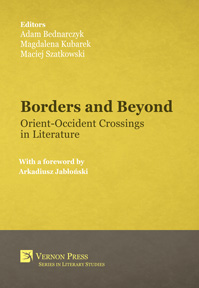Search
Browse
by Publication status
by Subject
Anthropology (26) Art (124) Business and Finance (26) Cognitive Science and Psychology (54) Communication and Journalism (45) Economics (62) Education (66) History (149) Human Geography (22) Interdisciplinary (42) Language and Linguistics (129) Law (16) Music Studies (18) Philosophy (157) Political Science and International Relations (103) Sociology (304) Statistics and Quantitative Methods (20)by Series
Series in Literary Studies (65) Series in Philosophy (59) Series in Education (51) Series in Sociology (42) Series in Politics (32) Series in World History (32) Bridging Languages and Scholarship (31) Series in Language and Linguistics (25) Cognitive Science and Psychology (20) Series in American History (20) Series in Philosophy of Religion (20) Series in Art (19) Critical Perspectives on Social Science (16) Series in Cinema and Culture (16) Curating and Interpreting Culture (15) Series in Critical Media Studies (14) Series on the History of Art (14) Series in Anthropology (13) Series in Business and Finance (13) Economics (13) Series in Music (12) Series in Communication (9) Series in Performing Arts (9) Philosophy of Personalism (8) Series in Law (8) Series in Economic Methodology (7) Series on Climate Change and Society (7) Women's Studies (7) Classics in Economics (6) Series in Economic Development (6) Philosophy of Forgiveness (5) Series in Built Environment (5) Series in Economic History (5) Series in Philosophy of Science (4) Series in Social Equality and Justice (4) Series on the History of Science (4) Serie En Estudios Literarios (3) Serie en Sociología (3) Series in Contemporary History (3) Series in Creative Writing Studies (3) Series in Design (3) The Interdisciplinary Built Environment (3) Serie en Comunicación y Medios (2) Serie en Historia (2) Series in Heritage Studies (2) Series in Innovation Studies (2) Series in Philosophy of Race (2) Serie en Ciencias Políticas (1) Serie en Entorno Construido (1) Serie en Estudios Culturales (1) Serie en Filosofía (1) Serie en Filosofía de la Ciencia (1) Serie en Música (1) Series in Classical Studies (1) Series in Economics of Technological Change (1) Series in Urban Studies (1)by Language
English Spanishby Author
Browsing with filters
Positioning English for Specific Purposes in an English Language Teaching Context
Ivana Nešić
et al.
Availability: In stock
292pp. ¦ $62 £44 €50
With the unrelenting spread of globalization, the English language has been firmly established as the Lingua Franca. Now more than ever, the importance of learning English is paramount within nearly all professional and educational sectors. English for Specific Purposes (ESP) has long been accepted as an effective method for teaching English as a foreign language. In recent years, it has experienced an increasing presence in secondary and tertiary education across the globe. This is predominantly due to its learner-centered approach that focuses on developing linguistic competence in the student’s specific discipline, may that be academics, business or tourism, for example. Positioning English for Specific Purposes in an English Language Teaching Context attempts to present and define the relevance and scope of ESP within English Language teaching. From mobile phones as educational tools to the language needs of medical students, the contributors to this volume examine and propose different epistemological and methodological aspects of ESP teaching. Its unique approach to ESP marks this volume out as an important and necessary contribution to existing ESP literature, and one that will be of use to both researchers and practitioners of ESP.
Cultural Encounters: Cross-disciplinary studies from the Late Middle Ages to the Enlightenment
Edited by
Désirée Cappa, Warburg Institute et al.
Availability: In stock
182pp. ¦ $57 £41 €46
This collection of essays contributes to the growing field of ‘encounter studies’ within the domain of cultural history. The strength of this work is the multi- and interdisciplinary approach, with papers on a broad range of historical times, places, and subjects. While each essay makes a valuable and original contribution to its relevant field(s), the collection as a whole is an attempt to probe more general questions and issues concerning the productive outcomes of cultural encounters throughout the Late Medieval and Early Modern periods. The collection is divided into three sections organised thematically and chronologically. The first, ‘Encounters with the Past,’ focuses on the reception of classical antiquity in medieval images and texts from France, Italy and the British Isles. The second, ‘Encounters with Religion,’ presents a selection of instances in which political, philosophical and natural philosophical issues arise within inter-religious contexts. The final section, ‘Encounters with Humanity,’ contains essays on early science fiction, political symbolism, and Elizabethan drama theory, all of which deal with the conception and expression of humanity, on both the individual and societal level. This volume’s wide range of topics and methodological approaches makes it an important point of reference for researchers and practitioners within the humanities who have an interest in the (cross-)cultural history of the medieval and Renaissance periods.
Borders and Beyond: Orient-Occident Crossings in Literature
Edited by
Adam Bednarczyk, Nicolaus Copernicus University in Torun, Poland et al.
Availability: In stock
282pp. ¦ $63 £45 €51
The work presents articles discussing various subjects relating to literary, cultural borders and borderlands as well as their crossings with the Orient and the Occident. A broad, multifaceted scope of the volume draws the attention of readers to the problem of liminal spaces between cultures, genres, codes and languages of literary and artistic communication. The perspective of borderness proposed by orientalists, literary specialists, culture experts provide insights into multi-dimensional and heterogenic subjects and methods of consideration. The authors referring to, inter alia, comparative studies, theory of reception, intertextuality, transculturality of the East and West works touch upon themes such as coexistence, exclusion, crossing or the instability of borders. Also by taking into account identity issues, the interpenetration of various influences between different literatures, poetics and languages, the readers gain a broader context of intercultural dialogue between the Orient and Occident, what allow them to transgress barriers of a purely artistic, literary reception of the book contents. The volume – due to the abundance of proposed topics, its heterogeneous representations and manifold approaches used in analysis, discussion and (re)interpretations – is a debate’s record or a result of an academic reflection rather than a comprehensive monograph.
Forensic Linguistics
Asylum-seekers, Refugees and Immigrants
Edited by
Iman Nick, Germanic Society for Forensic Linguistics (GSFL)
Availability: In stock
230pp. ¦ $60 £43 €48
According to international statistics, the world is currently undergoing one of the largest refugee catastrophes in modern history. This humanitarian crisis has stimulated the mobilization of countless private and public rescue and relief efforts. Yet, deep-seated concerns over potential breaches of national security and wide-spread fears over uncontrolled mass immigration have prompted many policy-makers to caution against the unregulated entry of foreigners with little or no identity documentation. In an effort to strike a balance between addressing the needs of these two competing sets of concerns, an increasing number of governments have instituted policies and procedures for identity verification. In this multi-authored work, the focus is placed upon the widespread governmental use of language analyses to investigate displaced persons’ registered origins. This dynamic collection of writings provides readers with a thought-provoking, politically-stimulating, intellectually challenging examination of the pitfalls and promise of these practices across differing sociopolitical, legal, linguistic, and geographical contexts. This contextual diversity reflects the unique strength of this reference work. Unlike so many other publications on the market that focus rigidly upon a single vantage point, this work offers a dynamic exploration of the theory and practice of language analysis for governmentally-mandated identification procedures. From the linguistic scholar to the human rights activist, the agency worker to the asylum-seeking applicant, this collection offers a complex and rich cross-section of professional and personal experiences. The multiplicity of perspectives is powerfully complemented by the heterogeneity of disciplines represented in this work. From sociology, psychology, demography, and language policy to linguistics, ethics, international affairs, government and politics, this work will satisfy a wide variety of readers’ scholarly interests and commensurately serves as an excellent reference work for researchers and practitioners as well as a valuable teaching resource for graduate and undergraduate courses.
Answering the New Atheists: How Science Points to God and to the Benefits of Christianity
Anthony Walsh, Boise State University
Availability: In stock
208pp. ¦ $59 £42 €48
In the face of increasing attacks on Christianity by militant new atheists, Christians should be able to robustly defend their beliefs in the language spoken by Christianity’s detractors—science. Atheists claim that science and religion are incompatible and in constant conflict, but this book argues that this is assuredly not true. In order to rebut the polemic agenda of the new atheists who want God banned from the public square, this book engages with the physical and natural sciences, social science, philosophy, and history. It shows that evidence from these diverse disciplines constitutes clear signposts to God and the benefits of Christianity for societies, families, and individuals. Answering the New Atheists begins by examining what new atheism is, before demolishing its claim that Christianity is harmful by showing the many benefits it has for freedom and democracy, morality, longevity, and physical and mental health. Many historians of science contend that science was given its impetus by the Christian principle that a rational God wants us to discover his fingerprints on nature. Thus, in subsequent chapters, Walsh presents a well-informed and philosophical-based analysis of the Big Bang and cosmic fine-tuning, the unimaginable improbability of factors that make this planet habitable, and the multiverse often called the “last refuge of the desperate atheist.” Interdisciplinary in its approach, this book adeptly explores the very problematic issues of the origin and evolution of life that have forced many top-rate scientists including Nobel Prize winners, who have thought deeply about the philosophical meaning of their work, to accept God as the Creator of everything.






